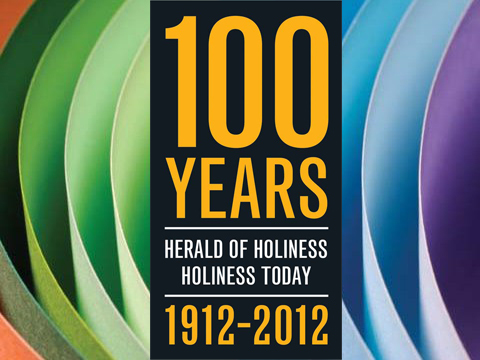Second-Century Vision

Recently, we (HT) sat down with David Felter (DF), Holiness Today's editor in chief with a few questions about his perspective on the second century of the Church of the Nazarene's magazine.
HT: What is the function and purpose of HT?
DF: The official publication of the Church of the Nazarene has a clearly defined purpose or rationale: It is to clearly enunciate the message, doctrine, and experience of holiness.
To do this, we approach our task with variety and diversity. We use a combination of thematic emphases such as:
"Facilitating the pursuit of practical holiness"
"Changed people, a changed world"
"Everyday holiness"
"Our Message and Mission"
HT: What elements of our "story" persist over time, endearing themselves to our constituency?
DF: I believe there are seven elements of our story that have enduring persistence.
The first is our message. Tom Nees, former director of USA/Canada Department (now Region), often reminded us, "We are a message-driven church."
Second, we affirm our faithful allegiance to the authority of God's Word, the Bible.
Third, we celebrate the sense of connectionalism throughout the denomination. HT represents a strong advocacy for our international church, its judicatory structures, and the global, cooperative agenda for mission.
Fourth, HT has strongly affirmed our conviction about evangelism. Global evangelism exists as a responsibility in the Church because it originates in the heart of a missionary God.
Fifth, we faithfully affirm our allegiance to the distinctive doctrine of the entire sanctification of believers, as stated in our Articles of Faith.
Sixth, we celebrate the conviction that holiness is expressed in compassion, justice, and transformation.
Finally, we acknowledge our commitment to the Covenant of Christian Conduct as instructive for Nazarenes intent on living holy lives everywhere.
HT: Going forward, what are the critical issues that HT must address?
DF: This is an important question for the magazine to consider.
We believe it our duty to reinforce, affirm, and celebrate our alignment with the Scriptures:
- As authoritative as our rule of both faith and practice.
- As inerrantly revealing the will of God concerning us in all things necessary to our salvation.
- As the directive for holy living.
- As establishing the criteria for Christian profession.
- As a well-spring of hope for the Church living through change.
- As the foundation of our message and mission.
We believe it to be our responsibility to celebrate and consistently affirm the identity of the Church of the Nazarene in clarity without embarrassment or timidity.
Connectionalism is that realization that we can accomplish more through collaboration and cooperation than we can through individual efforts.
Collegiality describes shared objectives'unity in common purpose, collaboration and cooperation, and respect for others.
The values of a connectional church can be articulated, celebrated, and affirmed by a denominational publication such as HT.
We believe it is our responsibility to tell the story of the Church of the Nazarene engaged in the mission of God.
HT: What will HT look like in the near future?
DF: Recently the University of Southern California's Annenberg Center for the Digital Future offered some prophesies for the future of media. High on the list was a chilling prediction: Within five years, the report claimed, only four major daily papers will continue in print form.
According to Jeffrey I. Cole, director of the center, the four survivors will be The New York Times, The Wall Street Journal, The Washington Post, and USA Today. It's worth noting that two of these papers—the Times and the Journal—already charge for on-line content. Within the next year, USA Today also plans to start charging, which will leave The Washington Post as the only one of the big four offering free content.
HT: How long will HT be available in print-form for Nazarenes to read?
DF: The short answer is: "It depends."
Advertising would provide much-needed revenue, but could become what the IRS calls unrelated business income, thus requiring filing of federal tax forms.
Pastors, once our strongest supporters of HT, now seem less inclined to promote subscriptions to their church members.
While an all-electronic version of HT may be required if financial resources no longer permit print publication, it may leave many of our good readers who do not have computer or broadband access behind. (Others have indicated they prefer the tactile experience of holding a magazine to read.)
Falling subscription rates to HT require us to project a date in the future when the content of the magazine will be available only online. We are preparing for this occurrence and believe it will provide a high-value experience for online subscribers.
HT: Any closing thoughts?
DF: What is adamantly true, however, is our commitment to remain faithful to our mission, objectives, and responsibilities, regardless of the delivery system of the future. HT will bring to life the powerful stories of a people who describe themselves as Christian, holiness, and missional.
Please note: All facts, figures, and titles were accurate to the best of our knowledge at the time of original publication but may have since changed.




